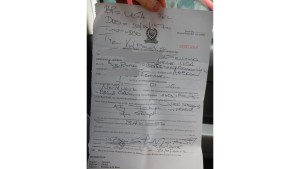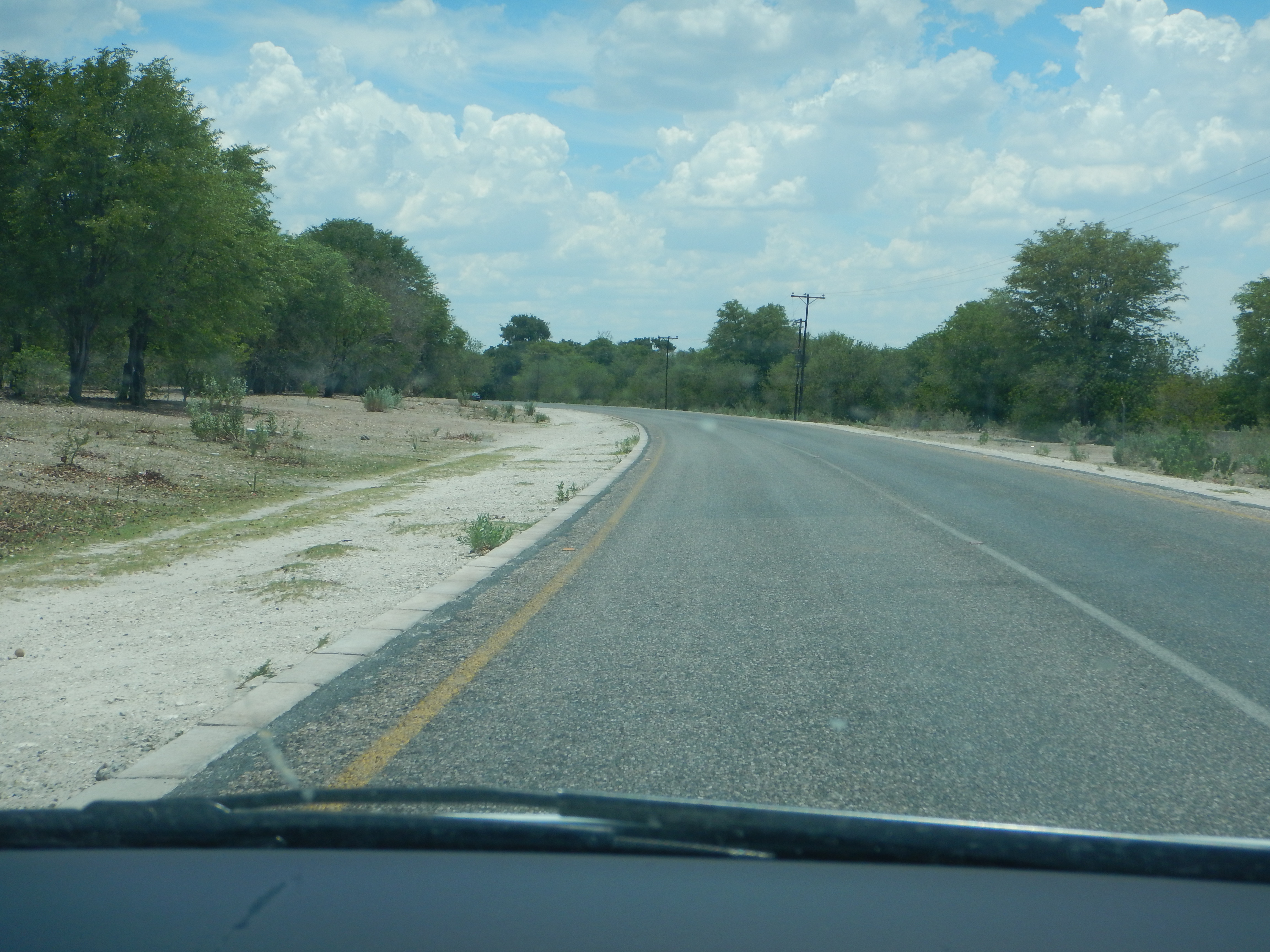I got a speeding ticket driving to Lake Ngami. I was going along (as we all do) and saw the speed limit drop to 80 km/hr, then 60. I took my foot off the accelerator and literally thought – I am in the middle of nowhere – police unlikely – should slow down anyway– goats likely. Welcome to Tapeng.
The police officer came running out into the road and flagged me down – gave me a fright before my brain clicked in that I was being pulled over (pula-ed over as my husband would say).
“Dumela, how are you?” I said politely. “Not good, you were speeding”, he said. He told me to get out of my car and go and see his colleague waiting in the patrol car. Fine. I grabbed my International Driver’s License (for what it’s worth) and my Tennessee license. The colleague invited me to take a seat while he wrote out my ticket and asked me all sorts of questions about where I was from and why I was there and where I was going and where I worked, etc. He had large definite hand-writing with sharp flourishes and heavy strokes underlining my fine of 340 pula (US$34). Okay – not so terrible. I can handle 340 pula. Could be much worse.
He said I could pay him right then – “Everything is here, receipt book, everything we need”.
Hmmm. For a tiny instant I thought about corruption and bribes and other weird uncomfortable practices that happen in some African places. But Botswana has an active anti-corruption campaign. I didn’t get the sense that this was wrong. It felt legitimate. So, back to my car. I had two 200 pula notes in my bag.
Too bad for me. When I tried to pay the officer, he just shook his head. “No change,” he said. I would need to go to the police station in Sehithwa, where I was headed anyway. Okay – so now it felt pretty legit, just inconvenient. “Where is the police station in Sehithwa?” I asked. I was thinking this was a reasonable question. “What – you don’t know! You need to know where police stations are. What if you need help!” he exclaimed. I suddenly felt like I hadn’t done my homework. “I’ve never been to Sehithwa,” I stammered. He just shook his head and gave me directions. Meanwhile I thought it was useful information that I should go to the police station if ever I need help.
25 minutes later, I arrived at the very grand Sehithwa police station, an unexpectedly immense complex at the end of a dusty road on the outskirts of the village. I tried to pay my fine. I gave the ticket and the 400 pula to a nice officer who walked up and down the corridor several times on my behalf, but eventually returned, saying that he also had no change. What is with these people? If they expect to receive fines, shouldn’t they have some change? “You can pay in Maun. You have 14 days,” he said with a pleasant smile and a hand shake. “Have a good day.”
I got back to Maun in time to visit the main police station. I braced myself for a long line and said a little prayer about change. But I was pretty confident this would be the place to rid myself of those pesky 340 pula.
Ha. Think again. I was guided to the traffic office by various people waiting in lines or having tea breaks. Right away, they said I could not pay my fine because there was no receipt book! I was grateful that I didn’t have to stand in line to learn that important piece of information. “Go to Maun Airport” said an officer as he rushed by.
Okay – why not. I had already tried three times to pay my ticket. Might as well follow this thing through to the bitter end. Off to Maun Airport – a 5 minutes’ drive away. I parked in a nice shady spot, admired the flowering flame tree at the edge of the gravel parking lot, skirted the teetering statue of a hippo and climbed the stairs to the second floor of the airport.
I have already visited this particular police station because I needed them to certify a copy of my passport picture page. Incidentally, they don’t certify international passport copies at the Airport Office. So, I felt right at home. I lingered briefly in the doorway before being invited to perch on the end of a short bench next to three other people also there to pay their traffic tickets. Botswana people have a wonderful habit of inviting you to sit down whenever you have to wait. There are always chairs available.

An officer appeared from nowhere and took my ticket, which she read closely. “You will not be able to pay your fine today,” she said. “Why on Earth not,” I thought – but I said, “oh really, why is that?” The three people ahead of me were paying three fines, and guess how many receipts were left in the book! “When will you get another receipt book?” I asked. I felt naïve even suggesting the idea. “I don’t know,” she said. The lady sitting next to me on the bench nudged me in the ribs and said “glad I got here before you” and had a good chuckle. We all had a good chuckle and I pointed out that the main police station had the same problem. The lady sitting next to me said I should “try the main police station again tomorrow at 10 o’clock.” “They will have them tomorrow,” she assured me, though why she would know was not clear to me.
Anyway, I know where they can get 340 pula to buy more receipt books. I’ll try again next week.
A follow-up on what happened:
I did finally pay my ticket some 10 days later at the main Maun Police Station. With my kids in tow, we went in, the same 400 pula in hand. Seriously – you’d think I’d learn my lesson. Exact change needed – but still I had 400 pula to pay 340 pula in fines.
We spent our first 20 minutes sitting next to the desk of a lady officer doing paperwork on a computer. There were five other officers and clerks sitting at a long conference table in the same office. They were chatting in Setswana. The walls were held up by tall columns of files, stacked two feet deep and to the ceiling. Blocks of files were bundled with string.
Sitting under the chair of the lady officer was another worker who appeared quite comfortable as she sorted through one of the file bundles, presumably looking for something in particular.
The lady officer engaged me in casual conversation as she typed away on a topic unrelated to my fine. “Do your children like school?”, “where do you stay in Maun?”…..
After a while, she suggested I go to another office to pay my fine. Apparently I had been sitting in the wrong place all that time. Though no one mentioned it.
The new office was just down the hall. Inside were a gentleman officer and a lady wearing a pretty red dress. They were sorting a large stack of cash. Thousands of pula in all note denominations were mounded on the table in front of them, perhaps from other fines.
They invited me to have a seat, as is the custom. I mentioned that I needed to pay a fine and then I waited. They continued their counting. My children stood on either side of me, taking in the scene.
After a few minutes, they took my traffic ticket and read it carefully. I presented my 400 pula. “We have no change” said the lady. I noted that her face was quite serious despite the obvious presence of a large mound of change sitting on the table. “Really?” said I. “But they have change on the table,” whispered my astute child.
“What should I do?” said I.
“Get change from Shoprite down the road”, suggested the gentleman officer.
I calculated the time. The Police Station closed in 30 minutes. Shoprite is 15 minutes away. I thought about stores that are closer.
“You have time,” said the gentleman officer, reading my thoughts.
I sighed, resigned to the reality that I need exact change to pay this fine. The mound on the table seemed off limits.
“Okay, thank you”. I gathered my bag, my ticket, and my ineffective 400 pula and guided my children back to the car. As we backed out of the crowded parking area, a man hailed and pointed. The lady in the pretty dress was waving from the doorway, calling me back.
I re-parked the car, trundled my children back into the office, sat in the same chair. “We have found change,” said the lady miraculously as she dug into the mound of cash, extracting the needed 60 pula in exchange for my 400. She filled out my receipt – a long winded form that recapitulated all the information on my ticket plus evidence of the fine being paid.
I waited breathlessly, anticipating another reason why the transaction would not be complete. It is interesting to me how often transactions are not complete here – how it can take several attempts, each with lots of social interaction and engagement.
Even now, both the gentleman officer and lady asked us lots of questions. They quizzed my children about school and life in Maun. The lady reproved my choice to to bring my children to Botswana and in the process interrupt their education in the United States. With my receipt almost complete and change in hand, I defended my choice – pointing out that international travel is also part of my children’s education.
Suddenly the officers softened. They laughed. They asked if we liked Maun. We said we did, which is true. They seemed satisfied, handed over my receipt, and waved us cordially out.
At this point my interactions at the Police Station, to pay a simple fine, had taken about 90 minutes. I was castigated for my choices that had nothing to do with speeding. My children were harassed and quizzed. I might have had to show my passport.
The experience should have been benign and brief, but was in fact disquieting and time consuming. Draining time from others is a form of inequity. Is this how legal immigrants are treated in America? It’s a useful reminder that the “authorities” can be quite threatening and unhelpful when they are not on your side.
